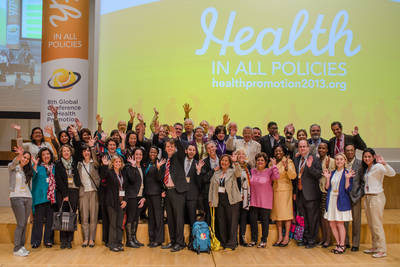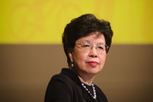WHO Director General Dr. Chan warns again against vested interests
“Efforts to prevent non-communicable diseases go against the business interests of powerful economic operators. In my view, this is one of the biggest challenges facing health promotion”, said Dr. Margaret Chan in her opening address to the Health for All conference in Helsinki.
 For the third time within a few weeks the Director General of the World Health Organization has warned against the influence of vested interests in the formulation of global health policies. More than 900 participants from all over the world heard Dr. Chan use her opening speech at 8th the Health for All conference in Helsinki on the 12th of June to focus on conflict of interest in health promotion.
For the third time within a few weeks the Director General of the World Health Organization has warned against the influence of vested interests in the formulation of global health policies. More than 900 participants from all over the world heard Dr. Chan use her opening speech at 8th the Health for All conference in Helsinki on the 12th of June to focus on conflict of interest in health promotion.
Dr. Chan made reference back to the 1980s: “…when we talked about multisectoral collaboration for health, we meant working together with friendly sister sectors. Like education, housing, nutrition, and water supply and sanitation. When the health and education sectors collaborate, when health works with water supply and sanitation, conflicts of interest are rarely an issue. Today, getting people to lead healthy lifestyles and adopt healthy behaviours faces opposition from forces that are not so friendly. Not at all”.
See the full text of Dr. Chan's speech here. The web site of the 8th Health for All conference.
Compared to the 1980s, efforts to prevent non-communicable diseases now go against the business interests of powerful economic operators. Said Dr. Chan, “In my view, this is one of the biggest challenges facing health promotion. As the new publication makes clear, it is not just Big Tobacco anymore. Public health must also contend with Big Food, Big Soda, and Big Alcohol. All of these industries fear regulation, and protect themselves by using the same tactics”.
Dr. Chan continued by pointing at the fact that health promotion now meets formidable opposition and that market power readily translates into political power. She expressed her particular concern over two recent trends: “The first relates to trade agreements. Governments introducing measures to protect the health of their citizens are being taken to court, and challenged in litigation. This is dangerous.
The second is efforts by industry to shape the public health policies and strategies that affect their products. When industry is involved in policy-making, rest assured that the most effective control measures will be downplayed or left out entirely. This, too, is well documented, and dangerous. In the view of WHO, the formulation of health policies must be protected from distortion by commercial or vested interests”, said the WHO Director General, Dr. Margaret Chan.
RELATED ARTICLES
- New report highlights benefits of policy measures to prevent harmful alcohol consumption
- WHO consultation on global alcohol strategy and the way forward
- Spirits industry afraid of their own ingredients?
- Alcohol use - a barrier to health and to the achievement of the SDGs
- Government investments in alcohol industry up against the wall
- Abstracts for GAPC 2020 – deadline 29 July 2019
- A regional African alcohol coordination mechanism is needed
- New book reveals a series of unethical business practices by Heineken in Africa
- SAAPA applauds WHO position on no industry collaboration
- Next GAPC to be held in Dublin in March 2020

